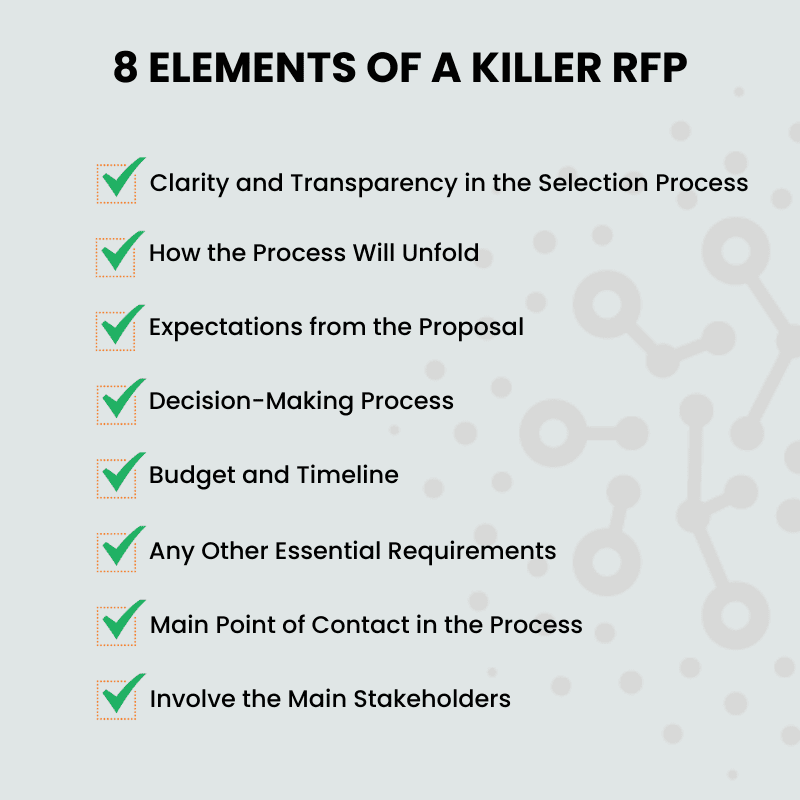Writing an RFP for consulting services is challenging. Project scope is not something you can measure, and it is often the result of extensive discussions within your teams. Many companies rush their request for proposal and send a one-page definition of their needs.
As a buyer, you need to put yourself in the consultants’ shoes to understand how vital a clear RFP is for them too. Answering a request for proposals takes time, energy, and, yes, money.
“If your content isn’t driving the conversation, you’re doing it wrong.” – Dan Roth
As a partner in any consulting firm, you need to assess the ratio of benefits vs. risks before engaging resources into designing an answer. When you have a vague RFP – no or little context and unclear deliverables – you should be wary.
But an RFP is not limited to the project purpose and requirements. The consultants also need to understand how the process will unfold, what you expect to find in a proposal, and how you will evaluate them.
8 Key Elements of an RFP for Consulting Services
#1. Approach to the Selection Process
Clarity and transparency in the selection process matters a lot and can make a big difference in the quality of the product you will receive. You need to communicate and describe to the prospective providers how the selection process will unfold.
First, let’s outline the key milestones for the RFP process. It is important for consulting candidates to understand how much time they have to prepare and submit their proposal. It will also give them an idea on when the project could start.
Usually, at this point, you should have signed a Non-Disclosure Agreement with the potential candidates. Even if this step is not mandatory, we highly recommend protecting your confidentiality.
#2. How the Process Will Unfold
Distribution of the RFP and Intention to Bid: The RFP is sent out to potential consultants, who indicate if they’ll bid.
Questions and Answers Pre-proposal Submission: Before bids are in, consultants can ask questions about the RFP. All answers are shared with every potential bidder for transparency.
Timeframe for Proposal Reception: This outlines the window of time in which consultants can submit their proposals. It’s essential to have a clear deadline, ensuring all participants have an equal duration to prepare and submit their bids.
Short-list and Feedback: Once all proposals are received, they are reviewed, and a short-list of the most suitable ones is created.
Presentations: Shortlisted consulting firms or service providers are often invited to give a presentation. This provides a more in-depth look at their proposal, allowing for interactions, clarifications, and showcasing their expertise in a more interactive format.
Selection: After reviewing the written proposals and presentations, a final selection is made. This decision is based on various criteria like expertise, cost, approach, and the potential value they bring to the table.
Project Kick-off: Once a consulting firm is selected, the project officially begins. The kick-off is an essential step where both the client and the consultant align their objectives, define roles and responsibilities, set milestones, and establish communication protocols to ensure the project’s success.
#3. What You Expect in the Proposal
Navigating a dense, 70-slide proposal can be daunting. Trust me, consultants can and will produce them if left unchecked! So, why not simplify the process for everyone? By being upfront about what you’re looking for in an RFP, you’re not only aiding consultants in crafting a focused proposal, but you’re also ensuring that you receive the concise, relevant details you truly need.
To enable proper comparisons, do not hesitate to specify in your RFP a few expectations of the proposal and from the consultant, for example, you can include:
- Project Overview: Clearly outline the objectives, the approach, key deliverables, project timeline with major milestones, and the suggested project management structure. Also, specify any contributions they expect from your side.
- Expertise Evidence: Consultants should demonstrate their competence. Ask for references from similar projects, CVs of the consultants expected to work on the project, and any relevant thought leadership articles or papers they’ve produced.
- Fees and Workload Breakdown: Insist on a detailed breakdown of fees and expected workload. This ensures transparency and helps you understand the project’s cost structure.
#4. How You Will Make Your Decision
Your selection criteria and expectations of the proposal have to be explicit. In principle, you know already how you will perform the selection. If not, well, that is the right moment to think about it. Selection criteria are usually a blend of components such as:
The capability of the firm to get the job done – Leveraging feedback from previous clients on previous projects.
The expertise of the firm in the required field – Ideally, the consulting firm should provide some thought leadership or position papers in the niche.
The clarity of the approach and the deliverables – You need to understand if the deliverables are those you expect but also to understand how the consultant intends to get there.
The composition of the team – You need to make sure that the consultants who will work on the project daily have the right seniority and experience.
The fit with the company – In short, do you think you will work well together? Will they have the right impact and recognition with your peers?
The price of the project – Can you afford their services? Are you getting a clear value for your money? Are there hidden fees to be considered?
As you can see, these considerations are much broader than the sole price. Even though there is no magic formula using clear criteria, communicating them to the Consulting firms early in the process is key for getting a high-quality proposal, and taking informed and fair decisions.
#5. What Are the Budget and the Timeline?
Whether your project is urgent or not, you likely have a timeline in mind. Or at least some internal deadlines or meetings. Knowing your schedule for the project is key for the consulting candidates. It will directly impact the team composition and the cost of the project.
Users and buyers rarely include their budget in the RFP. However, if you are on a very tight budget, it can make sense to include that information in the RFP to make sure that you don’t lose time for proposals you cannot afford. Besides, the consultants will be able to come up with trade-offs or design-to-cost proposals.
#6. Do You Have Other Requirements
You might have other requirements that you want to include in your RFP. For instance, you might be interested in having references and contact information to check the references. You can also have some eligibility criteria linked to your internal procurement policies. Maybe your consulting providers have to be registered as a provider.
#7. Who is Their Contact
You also need to define the main point of contact during the process. Will it be someone from procurement, one of the executives, or even a third party? All the interactions with Consulting firms during the RFP process should go through that person. Letting the Consulting firms connect directly with the Executives of their choice would give an advantage to the incumbents and distort the competition.
#8. The Tricks That Make All the Difference
Involve the main stakeholders in the RFP process: Future Project Leader, Project Sponsor, Procurement Leader, Representatives from Finance and Strategy (for large projects) and key stakeholders for the project (i.e., corporate of other functions).
Engage them in the selection committee and organize face-to-face discussions with the finalists. If in-person meetings aren’t feasible, tools like Skype, Zoom, and Google Hangouts are effective alternatives. The diverse perspectives of your stakeholders can offer invaluable insights during selection.
Describe how the Q&A between sending RFP and receiving the proposal will be organized. When should the question be sent? How will the answers be shared with the consulting providers.
Closing Thoughts
Creating a thorough RFP for consulting is a must. It’s not just for bids – it shapes goals, involves stakeholders, and sets clear expectations. As you embark on your RFP journey, treat it as the first step to impactful collaborations.
A well-crafted RFP gives consultants better clarity about the context and expectations of your project, in turn, ensuring the optimum impact from your project. The eight elements described in this article can help you craft the most effective RFP. So leverage these components to fuel your path to success.
rfp for consulting services rfp for consulting services rfp for consulting services
rfp for consulting services rfp for consulting services rfp for consulting services
rfp for consulting services rfp for consulting services rfp for consulting services

How Consource Can Help?
With Consource guiding your journey, crafting RFPs becomes effortlessly smooth. Our platform fosters improved collaboration, provides adaptable content options, and infuses proven industry best practices throughout. Discover Consource and transform your RFP approach!









0 Comments